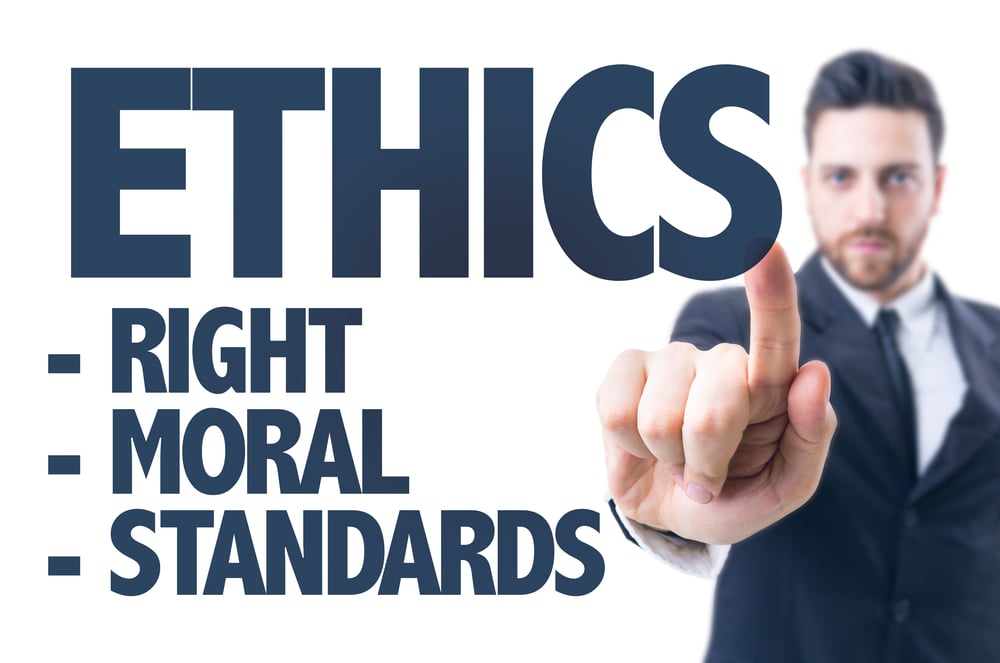Corporate social responsibility (CSR) is a term that refers to the voluntary actions that...
Why Ethics are Important in Business?
What is Ethical Behavior?
The concept of ethical behavior is often debated and can be interpreted in many ways. Generally speaking, ethical behavior refers to behaving in a morally correct and justifiable manner. This includes adhering to the laws and norms that society has put in place, as well as acting in a way that does not cause harm to others.
Why is Ethical Behavior Important?
Ethical behavior is important for a number of reasons. First and foremost, it helps to ensure the safety of those around us. When people act in an ethical manner, they are less likely to engage in activities that could put others in danger. Additionally, ethical behavior can help to build trust and relationships between individuals and groups. When people know that they can trust others to act in an ethical manner, it makes it easier to work together and cooperate. Finally, ethical behavior is important because it helps to create a fair and just society. When everyone adheres to the same standards of behavior, it creates a level playing field that is fair for everyone involved.
What is Business Ethics?
Business ethics refers to a set of principles that guide businesses in their decision making and behaviour. They can cover a wide range of topics, from how companies treat their employees and customers, to how they deal with environmental issues. Good business ethics help to create a positive workplace culture, build customer trust and make a business more sustainable in the long term.
There are many examples of good and bad business ethics. Some companies may choose to behave ethically in order to gain an advantage over their competitors, while others may behave unethically to save costs or increase profits. Good business ethics can be seen in companies that treat their employees fairly, act in an environmentally responsible way and are transparent in their dealings with customers and suppliers. Bad business ethics can be seen in companies that engage in activities such as bribery, price fixing or false advertising.
There are a number of ways in which businesses can improve their ethical behaviour. These include developing a code of ethics, establishing ethical training programs for employees, and conducting regular audits to identify areas where improvements can be made.
Why Ethics are Important in Business?
Ethics are important in business because they set the standards for how businesses should operate. Ethics provide a framework for businesses to make decisions that are fair, honest, and responsible. Additionally, ethical businesses build trust with their stakeholders, and this trust can lead to improved financial performance. Finally, ethical business practices can create a competitive advantage for businesses, and this advantage can lead to increased market share and profitability.

There are many reasons why businesses should operate ethically. First, ethical businesses build trust with their stakeholders. When businesses act ethically, they show that they are trustworthy and reliable. This trust can lead to improved financial performance, as investors and customers are more likely to do business with companies that they trust.
Additionally, ethical businesses can create a competitive advantage. Consumers are increasingly interested in doing business with companies that act responsibly and have a positive impact on society. As a result, companies that operate ethically can gain a larger market share and earn higher profits. Finally, ethical business practices can improve employee morale and motivation. When employees see that their company is behaving ethically, they are more likely to be proud of their work and have a positive attitude towards their employer. This can lead to increased productivity and loyalty among employees, which can benefit the bottom line.
There are many benefits of ethical business practices. However, it is important to note that businesses should not only act ethically because it is good for their bottom line. Rather, businesses should act ethically because it is the right thing to do. Ethical business practices protect the rights of employees, customers, and other stakeholders.
Additionally, ethical business practices can help to create a better world by promoting social responsibility and sustainability. Ultimately, businesses should strive to operate ethically because it is the right thing to do, and because it can lead to improved financial performance.
Ethical businesses build trust with their stakeholders, and this trust can lead to improved financial performance. Additionally, ethical businesses can create a competitive advantage for businesses, and this advantage can lead to increased market share and profitability. Finally, ethical business practices can improve employee morale and motivation. Ethical business practices are not only good for the bottom line, but they are also the right thing to do.

Examples of Good and Bad Business Ethics
There are a number of examples of good and bad business ethics.
One example of good business ethics is transparency. This means that businesses should be open and honest with their stakeholders about their operations and financials. Additionally, businesses should disclose any potential conflicts of interest. For instance, if a company is considering investing in a new project, it should disclose any potential conflicts of interest, such as if one of the company’s directors has a financial stake in the project.
Another example of good business ethics is social responsibility. This means that businesses should consider the impact of their actions on society and the environment. For instance, a socially responsible business might choose to use sustainable materials, or it might donate a portion of its profits to charity.
An example of bad business ethics is bribery. This is when businesses give money or gifts to government officials in order to gain an advantage. Bribery is illegal in many countries, and it can lead to criminal charges for both the business and the individuals involved.
How to Improve Business Ethics in Your Company?
There are a number of ways that you can improve business ethics in your company. One way is to have a code of conduct that all employees must follow. This code should outline what is expected of employees in terms of ethical behavior. It should also include consequences for violating the code.
Another way to improve business ethics is to provide training for employees on what is considered ethical behavior. This training can be in the form of seminars, workshops, or even online courses. Employees should be aware of what is expected of them and what the consequences are for violating the code of conduct.
Finally, you can create an environment in your company that encourages ethical behavior. This can be done by setting the tone from the top down and ensuring that employees feel like they can speak up if they see something unethical happening. You can also create a system of rewards and recognition for employees who display ethical behavior.

The Bottom Line: The Benefits of Good Business Ethics
There are many benefits to having good business ethics in your company. First, it can help to create a positive work environment. Employees who feel like they are working in an ethical company are more likely to be happy and loyal to the organization. This can lead to increased productivity and lower turnover rates.
Second, good business ethics can help to build trust between the company and its stakeholders. When stakeholders see that the company is behaving ethically, they are more likely to trust the organization and be willing to do business with it. This can lead to increased sales and market share.
Third, good business ethics can improve the reputation of the company. A company that is known for being ethical is more likely to attract new customers and business partners. This can lead to increased profits and growth.
Fourth, good business ethics can help to protect the environment. Companies that operate ethically are more likely to implement sustainable practices that help to preserve the environment. This can lead to reduced costs and a smaller carbon footprint.
Finally, good business ethics can help to create a competitive advantage. Companies that are known for their ethical behavior are more likely to be seen as leaders in their industry. This can lead to increased market share and profits.
Improving business ethics in your company is good for the bottom line. It can help to increase productivity, build trust, improve reputation, protect the environment, and create a competitive advantage. All of these things can lead to increased profits and growth for your organization. So, if you want to improve business ethics in your company, start by implementing a code of conduct, providing training on ethical behavior, and creating an environment that encourages ethical behavior. These three steps will help you get started down the path to success.
Ethics and Business Decision Making
When making business decisions, it is important to consider the ethical implications of your actions. Failure to do so can lead to negative consequences for your company, including legal penalties, damage to reputation, and loss of customer trust.
There are a number of resources that you can use to help you make ethical business decisions. These resources include codes of conduct, ethical decision-making models, and advice from experts.
Codes of Conduct
One of the best resources for making ethical business decisions is a code of conduct. A code of conduct is a set of guidelines that outlines what is expected of employees in terms of ethical behavior. It should also include consequences for violating the code.
Most codes of conduct are created by professional organizations, such as the Institute of Business Ethics. These codes can be helpful in making sure that you are considering the ethical implications of your actions.
Ethical Decision-Making Models
Another useful resource for making ethical business decisions is an ethical decision-making model. These models provide a framework for considering the ethical implications of your actions.
There are a number of different ethical decision-making models that you can use. One popular model is the utilitarian approach, which focuses on the impact of your actions on the greatest number of people. Another common model is the deontological approach, which focuses on duties and obligations.
Expert Advice
Finally, another valuable resource for making ethical business decisions is expert advice. There are a number of experts who can provide guidance on ethical issues. These experts include ethicists, lawyers, and consultants.
When seeking expert advice, it is important to make sure that you find someone who you can trust. You should also make sure that the expert is familiar with the ethical issues that you are facing.
Making ethical business decisions is not always easy. However, there are a number of resources that you can use to help you make the right choices. By using codes of conduct, ethical decision-making models, and expert advice, you can ensure that you are considering the ethical implications of your actions. This will help you make better business decisions and avoid negative consequences.

What is Corporate Social Responsibility?
Corporate social responsibility (CSR) is a type of corporate self-regulation in which a company monitors its own actions to ensure that they comply with ethical standards and social norms. CSR programs can include a variety of activities, such as charitable donations, environmental protection, employee training, and customer satisfaction.
The concept of CSR has been around for many years, but it has only recently gained popularity. In the past, CSR was often seen as a way to improve public relations or to distract from negative publicity. However, CSR is now seen as a legitimate business strategy that can create value for both businesses and society.
There are a number of reasons why companies may choose to implement CSR programs. First, CSR can help businesses build goodwill and trust with their stakeholders. Second, CSR can help businesses improve their operations and processes. Finally, CSR can help businesses meet their legal and regulatory obligations.
Benefits of Corporate Social Responsibility
There are a number of benefits that businesses can realize by implementing CSR programs. First, CSR can help businesses build goodwill and trust with their stakeholders. Goodwill is the positive reputation that a business has in the eyes of its stakeholders.
Stakeholders are individuals or groups who have an interest in the success or failure of a business. Examples of stakeholders include customers, employees, shareholders, suppliers, and the community.
When businesses engage in CSR activities, they are able to build goodwill with their stakeholders. This goodwill can lead to improved relationships and increased business opportunities.
Second, CSR can help businesses improve their operations and processes. CSR programs can help businesses identify and implement best practices. Best practices are those activities that have been proven to be effective in achieving desired outcomes.
By implementing best practices, businesses can improve their efficiency and effectiveness. This improved performance can lead to increased profits and shareholder value.
Finally, CSR can help businesses meet their legal and regulatory obligations. In many jurisdictions, businesses are required to comply with environmental, social, and governance regulations. CSR programs can help businesses ensure that they are in compliance with these regulations.
Glossary:
Moral and ethical beliefs: principals that guide an individual's behavior
Good reputation: the estimation in which a person or group is held by others
Trust: the belief that someone or something is reliable, good, honest, effective, etc.
Compliance: the act of following an order, rule, or request
Obligation: something that someone is required to do by law or social custom
Customer loyalty: the tendency of a customer to continue buying products or services from the same company
Ethical practices: practices that adhere to a moral or ethical code
Socially responsible: taking actions that will help improve society or the environment, rather than harm it.
Good corporate citizen: a company that takes actions to improve the communities in which it operates, rather than just focusing on profit.
Unethical behavior: behavior that does not adhere to a moral or ethical code. It can be illegal, harmful to others, or just considered morally wrong.
Ethical decisions: decisions that take into account the moral and ethical implications of the actions being considered.
Ethical standard: a set of values that guide an individual or group's behavior.
Values: the beliefs, customs, and principles that guide an individual or group's behavior.
Ethics in business: the study of the moral and ethical implications of business decisions and actions.
Legal: conforming to the law
Laws: a set of rules or regulations that a society, group, or government imposes on its members
Regulations: a set of rules or guidelines that govern how something should be done
CLICK HERE to request a free (no commitment) online demo of your desired compliance training topics





